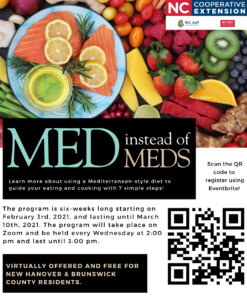Quick Introduction to Mediterranean Eating Style
go.ncsu.edu/readext?761011
en Español / em Português
El inglés es el idioma de control de esta página. En la medida en que haya algún conflicto entre la traducción al inglés y la traducción, el inglés prevalece.
Al hacer clic en el enlace de traducción se activa un servicio de traducción gratuito para convertir la página al español. Al igual que con cualquier traducción por Internet, la conversión no es sensible al contexto y puede que no traduzca el texto en su significado original. NC State Extension no garantiza la exactitud del texto traducido. Por favor, tenga en cuenta que algunas aplicaciones y/o servicios pueden no funcionar como se espera cuando se traducen.
Português
Inglês é o idioma de controle desta página. Na medida que haja algum conflito entre o texto original em Inglês e a tradução, o Inglês prevalece.
Ao clicar no link de tradução, um serviço gratuito de tradução será ativado para converter a página para o Português. Como em qualquer tradução pela internet, a conversão não é sensivel ao contexto e pode não ocorrer a tradução para o significado orginal. O serviço de Extensão da Carolina do Norte (NC State Extension) não garante a exatidão do texto traduzido. Por favor, observe que algumas funções ou serviços podem não funcionar como esperado após a tradução.
English
English is the controlling language of this page. To the extent there is any conflict between the English text and the translation, English controls.
Clicking on the translation link activates a free translation service to convert the page to Spanish. As with any Internet translation, the conversion is not context-sensitive and may not translate the text to its original meaning. NC State Extension does not guarantee the accuracy of the translated text. Please note that some applications and/or services may not function as expected when translated.
Collapse ▲We’re about a week into the New Year. How are you doing with that resolution to eat healthier? If that is a goal, but you’re not sure how to do it, how about a way that doesn’t involve excessive dieting, a major lifestyle change, or unusual foods. Sounds too good to be true? It isn’t. This is one resolution that you can keep.
I’m talking about eating the “med” way or a Mediterranean-style diet. The “med” way incorporates the basics of healthy eating that has been traditionally practiced in countries that border the Mediterranean Sea. Eating like those who live in the Mediterranean region has been shown to promote health and decrease the risks of many chronic diseases. Eating the “med” way can decrease your risk of some forms of cancer. It has been found to be more effective than a low-fat diet for weight loss in overweight and obese people. A Mediterranean-style diet also may improve eye health, including decreasing the risk of macular degeneration. There are other plusses too, especially related to blood pressure and cardiovascular disease.
Eating the Mediterranean way doesn’t require major changes in eating habits—just little switches that can make a big difference.
Here are the basics:
1. Get at least five cups of fruits and vegetables every day.
2. Eat primarily plant-based foods. Replace red meat with plant proteins, such as beans and legumes often.
3. Choose whole-grain foods such as oatmeal, quinoa, brown rice, and popcorn often.
4. Choose at least three ounces of nuts and seeds per week.
5. Swap the solid fats like butter and margarine in your diet for olive oil.
6. Use herbs and spices instead of salt to flavor foods.
7. Eat seafood at least three times per week.
8. Be physically active. Aim for at least 150 minutes per week or 30 minutes each day.
9. Drink red wine (this is optional).
10. Limit yourself to no more than three servings per week of sweets and sugar-sweetened beverages.
Dr. Carolyn Dunn, our state specialist in nutrition at N.C. Cooperative Extension and a group of professionals from NC State University and the NC Division of Public Health have developed a program they call Med Instead of Meds. The “med” they’re talking about is the Mediterranean Diet. This program encourages eating the med way to reduce your risk of needing to take medications.
Locally here in Brunswick County and New Hanover County, the Family and Consumer Science Extension staff along with our Extension Master Food Volunteers are gearing up to teach a series of virtual classes featuring Med instead of Meds.
Join us each Wednesday starting February 3, 2021, to explore how to “Go
Med” and eat the med way. Learn med tips and life hacks and get recipes that will help you eat the med way every day. These classes are FREE and will take place virtually for six weeks on Zoom. Classes will be held live at 2 p.m. But, if you cannot make that time, the sessions will be recorded and sent out to those who sign up.

There are several ways to register for this FREE online series. Contact our Family and Consumer Science Extension Agent, Meghan Lassiter,
meghan_lassiter@ncsu.edu, or call her at our office in Bolivia. Join us to learn more about the med way! You can check it at the Med Instead of Meds website to get you started on the program before February.
Source: Med Instead of Meds
Cheryle Syracuse is a Family and Consumer Science staff member and can be
reached at N.C. Cooperative Extension, Brunswick County Center 910-
253-2610 or by email at cheryle_syracuse@ncsu.edu.



